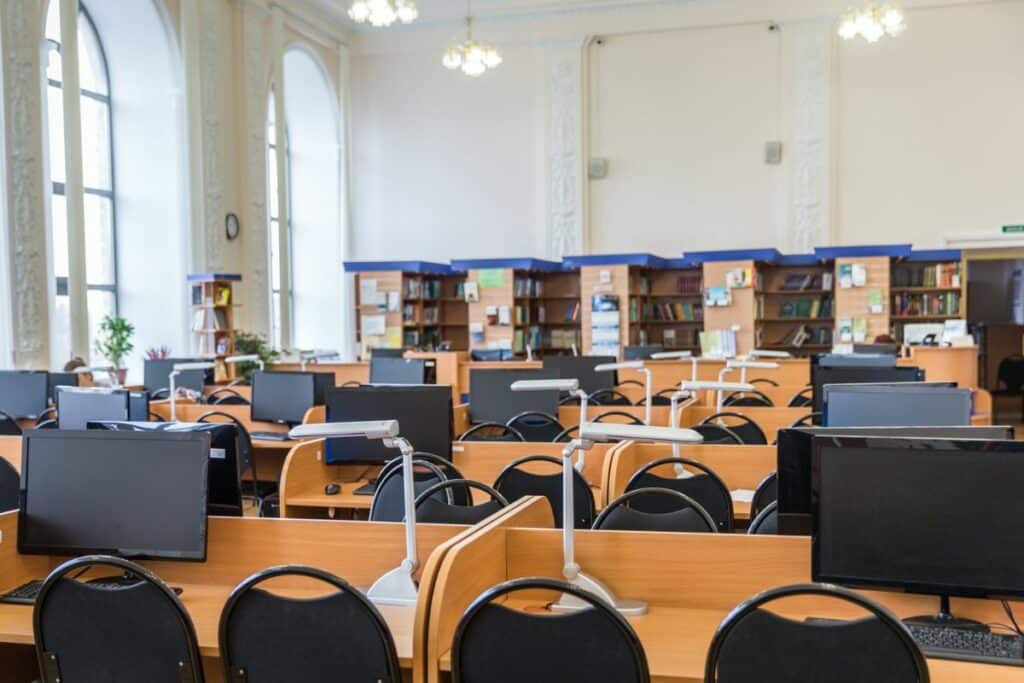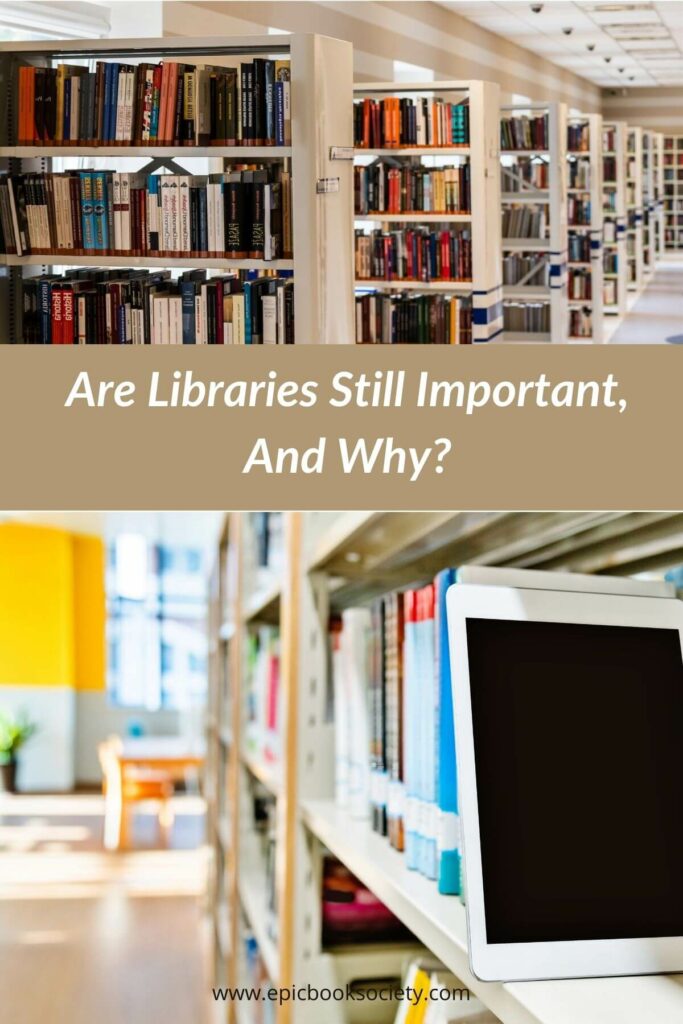Last Updated on August 18, 2023 by Louisa
In the modern age of the 21st century, the dependence on the internet for information is at an all-time high, and with the introduction of digital programs like AI, it only ever seems to be increasing.
It’s not just the way we consume information that’s taken a massive hit either, with the release of Amazon’s Kindle and other popular ‘e-readers’, the traditional paper and hardback book have too.
So, naturally, the important question to be answered is, are libraries still important? And if so, why?
The short answer is yes. Without really noticing it, libraries play an integral part in the development of wider society through a variety of different ways, from creating communities to helping students and scholars with finding historical references.
And there are so many more reasons why libraries are important, which I’ll share in more detail in this article.
What was the role of libraries in the past?
But first, a little history lesson. Since about 3000 BC, writing has been, and forever will be, the most important form of communication.
Whether it’s a text message, a hand-written note, or an etching on a prehistoric rock, writing allows us to express our ideas, facts, and knowledge in a clear manner for others to read and understand.
As the writing progressed into long forms of text on resources like clay tablets, the need to store these huge blocks of important information became apparent.
Thus, in the 7th century BC, the first library was born in modern-day Iraq: The Royal Library of Ashurbanipal.
This is the oldest known library known to man and featured more than 30,000 systematically organized clay tablets.
It was created by the Neo-Assyrian king Ashurbanipal as a way to preserve the history of the ancient region of Mesopotamia.
Throughout important periods of history, libraries were of paramount importance to the learning and development of people. One of the largest and most important of these ancient libraries was the Great Library of Alexandria in Egypt.

It was considered to be one of the greatest wonders of the ancient world, and at its height, the library was thought to contain up to 400,000 scrolls full of wisdom, knowledge, and information.
The Romans were known for their incredible libraries throughout their empire too, with the Library of Celsus within Ephesus being one, and the Ulpian Library in Rome another.
These were grand structures with various elaborate rooms containing marble bookcases, huge reading chambers, and open meeting spaces.
It is clear to see that libraries in the ancient world were important places, so what’s changed, and why is, or isn’t, that the case today?
What is the value of libraries in the digital age?

While historic libraries contained clay tablets and scrolls, the modern day library is more commonly filled with books.
The very first modern public libraries started appearing in the 19th century, providing access to a wealth of books, newspapers, and information, to anyone who wanted it.
Libraries became popular spaces for people to come to in order to escape the harsh realities of daily life.
They were government funded too, meaning it was completely free to enter.
Over time, public libraries adapted to new technologies being developed, keeping up with the times.
Digital resources like audiobooks and e-books became available, as did easy access to the internet through computers, laptops, and tablets. This helped libraries reach a much wider audience than before.
You can also find some libraries offer DVDs and other movie entertainment, as well as books.

Because devices like these are part of the library’s offering, they’re usually always free to use meaning they can be vital for people and families that might not be able to afford these expensive devices.
This means simple things like children’s homework can get completed, with schools increasingly turning to online learning for example.
It’s not just children that can benefit from public libraries’ digital offerings either.
The elderly and those not as familiar with all things digital can get one-to-one training on basic computer skills and online safety and security which is important for them to stay connected to friends, family, and loved ones.
For those that are already competent in the digital world, these simple library resources that may not have even been a consideration now seem integral in preventing certain groups of people from feeling isolated in the world’s ever-changing landscape.
Are libraries important to the community?
It’s not just the public library’s free resources that are useful either. They also provide a space for community leaders to host workshops for example and extra-curricular activities for schoolchildren, giving them further support in their learning and development.
Libraries offer the benefit of book clubs, after-school clubs, and various other groups and events hosted at the library and can be really important for a wide variety of people, all with different needs.

A great example would be a simple ‘Storytime’ session.
Families can bring their children; childminders can bring the young ones they’re looking after, and reading books and singing songs as a group can really help to take the pressure off of parents and the like.
At the heart of every library, however, is the vast collection of books it has and the love of books that those working there, and those that frequent it, share.
Unsurprisingly, libraries also hold regular events that bring the book community together as group reads, author readings, and exciting book launches.
Taking all of these events and activities into account as well as the different groups the library impacts, in a sense, the humble public library acts as a hub of the wider community.
Are there any economic benefits of libraries?
So, I’ve discussed, libraries play a crucial role in supporting the personal growth of people by providing them with valuable resources.
If we dive even deeper into the impact of libraries on society, we can also discover the economic advantages they offer.
Small businesses and SMEs form an unlikely partnership with the public library.
The events and workshops at the library that I mentioned earlier simply would not be able to go ahead if it wasn’t for the resources of local businesses.

The educators that come in to host workshops would be from the local area, the technology used might have been purchased from the local electronics shop, and perhaps the event might even be featured in the local newspaper.
Without realizing it, just a simple popular event hosted at the library can impact a multitude of local businesses.
Libraries also offer significant opportunities to people less fortunate in regard to searching for jobs and making professional resumes.
This in turn helps to bolster the academic level of the community and helps more people to get jobs creating a better local economy. It’s a tried and tested method and is often the backbone of the government’s manifesto.
It’s not just these job-related resources that are beneficial either, the libraries themselves are huge sources of employment.
You’ve got the librarians themselves, assistants and managers, library directors, accounts department, and even volunteering roles that can lead on to other career paths.
There’s also the actual spending of the general public too.
Even though public libraries are free, if you need to pop in to return a book, or gather some information for a dissertation for example, it’s highly likely that person will spend money on goods or services in other businesses within close proximity to the library itself.
Like an independent coffee shop for example, or the local mini-mart for a cold drink or snack.
What are the challenges facing libraries?

Like many businesses today, libraries face a number of problems and challenges that they will need to overcome in order to survive in the modern day.
We see in the news all too often how important government-funded public services are faced with funding cuts and all of the issues that come with it.
Unfortunately, libraries are often one of the first public resources to get funding cuts due to the fact libraries aren’t usually at the top of the government’s agenda.
Due to this reduction in funding, libraries are now relying more on grants to keep the lights on and the doors open.
This dependence on grants also increases their vulnerability as they are mostly provided by local councils.
A significant knock-on effect of this is not having a sufficient budget to attract and retain staff members leading to redundancies, and a lack of staff present.
I’ve touched on how libraries have done extremely well to keep up with the times in terms of everything digital, but it is still a massive challenge for them to continue to keep up with the trends.

As the world progresses technologically, the further it pushes the public library behind, and that’s even with the digital resources libraries have available.
One of the primary advantages of technology these days is that it’s usually small, compact, and can be taken anywhere.
This means that just from your mobile phone, someone can have a 1000-page book downloaded within a few seconds.
Unless you’re a true fan of the traditional book, a lot of people are more than happy with reading from their phone or Kindle, rendering libraries pretty useless.
Luckily, it’s not all doom and gloom though. There is a passionate network of people connected and involved in the day-to-day running of libraries and because of that passion, libraries are responding to some of these challenges.
Diversifying is a key way in which libraries are adapting.
I’ve spoken about e-books, audiobooks, and computers, but today you might even stroll into your local library and see the adoption of technology like virtual reality and augmented reality, enhancing visitors’ experience.
This offers massive new learning opportunities to people who weren’t there previously, and that’s all down to the amazing people that make libraries tick.
What Are Other Reasons Libraries Are Important?
I’ve shared a lot of information about why libraries are important in terms of their role in the community, but here are some other reasons you may want to consider…
1. They preserve history
Many libraries contain ancient books, 1st edition prints, and important historical documents between political leaders.
Consider the Library of Trinity College in Dublin as an example. It contains The Book of Kells, an important historical manuscript of the Gospel book in Latin.
And it’s not just the books themselves that contain history. Many of the libraries themselves are pieces of history that must be preserved.
Of course, not all libraries are historic, but many of the most renowned ones are.
2. Libraries can be architecturally beautiful

Some of the most beautiful buildings I’ve ever been to have been to libraries.
The Library of Congress Building in Washington comes to mind as a world-famous beautiful library, which features marble pillars and ancient artworks. The famous circular room is unlike anywhere else in the world.
The Strahov Library in Prague is a 17th-century library that has gilded decorations and Renaissance paintings on the ceiling.
3. They provide free education resources
As mentioned above, there are many free resources available at your local library such as digital classes for the elderly and homework clubs for kids.
4. They bring the community together
By providing a free space for the community to use, libraries bring the community together.
Some libraries even have meeting rooms that community groups can use, such as support groups and clubs.
5. They help promote a love of reading
It’s not just the wider community who come together in libraries, but readers like you and me.
If you’re looking to get out of a reading slump, or you just want to get back into the habit of reading, visiting a local library and being surrounded by choices of things to read can instill a love of reading.
So, Are Libraries Still Important?
As you can see from this guide, there are plenty of reasons why libraries are still so important even in the technologically-obsessed world of today.
It’s not just the book community that libraries are important too, they are vital in the development of the wider community, with an abundance of traditional and digital resources available to everyone.
It’s so important that you support your local library, because, without it, it may very well be shut down forever and converted into your town’s 6th Starbucks outlet.


